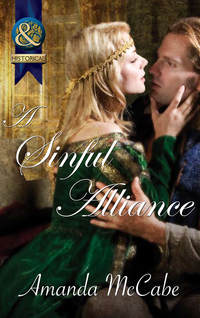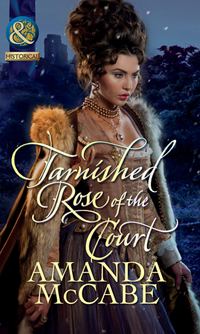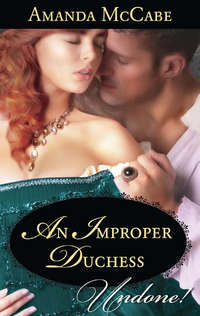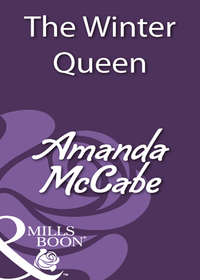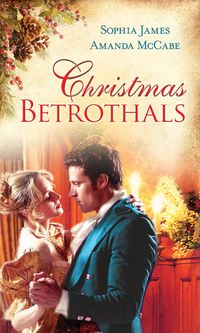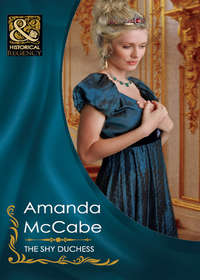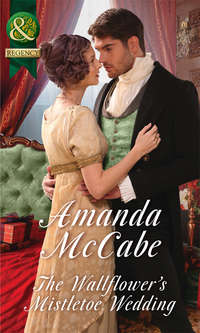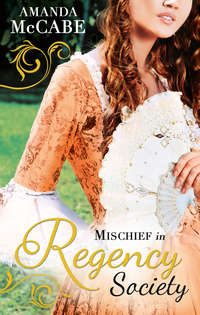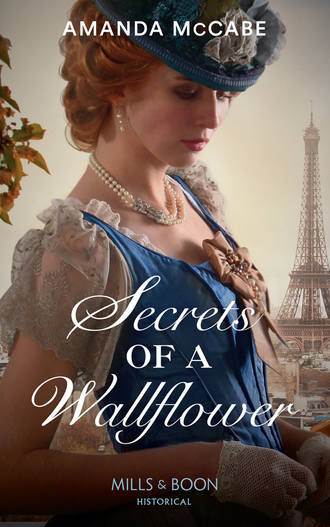
Полная версия
Secrets Of A Wallflower

A secret shared...
But can she trust him?
In this Debutantes in Paris story, Diana Martin is thrilled to be a writer covering the Parisian Exposition. But her new role must be kept quiet—her parents would never allow it! When enigmatic Sir William Blakely discovers her ruse, he knows it could lead her into danger. With the sparks igniting between them, William realizes the only way to protect Diana is by staying as close to her as possible!
Debutantes in Paris miniseries
Book 1—Secrets of a Wallflower
Look out for the next book, coming soon!
“McCabe sets the perfect tone, complete with all the elegant trimmings and sparkling warmth such genre fantasy can capture.”
—RT Book Reviews on The Wallflower’s Mistletoe Wedding
AMANDA MCCABE wrote her first romance at the age of sixteen—a vast epic, starring all her friends as the characters, written secretly during algebra class. She’s never since used algebra, but her books have been nominated for many awards, including the RITA®, Romantic Times Reviewers’ Choice Award, the Booksellers’ Best, the National Readers’ Choice Award and the Holt Medallion. She lives in Oklahoma with her husband, one dog and one cat.
Also by Amanda McCabe
A Stranger at Castonbury
Tarnished Rose of the Court
An Improper Duchess
Betrayed by His Kiss
The Demure Miss Manning
The Queen’s Christmas Summons
Bancrofts of Barton Park miniseries
The Runaway Countess
Running from Scandal
Running into Temptation
The Wallflower’s Mistletoe Wedding
Debutantes in Paris miniseries
Secrets of a Wallflower
And look out for the next book
Coming soon
Discover more at millsandboon.co.uk.
Secrets of a Wallflower
Amanda McCabe

www.millsandboon.co.uk
ISBN: 978-1-474-07377-6
SECRETS OF A WALLFLOWER
© 2018 Ammanda McCabe
Published in Great Britain 2018
by Mills & Boon, an imprint of HarperCollinsPublishers 1 London Bridge Street, London, SE1 9GF
All rights reserved including the right of reproduction in whole or in part in any form. This edition is published by arrangement with Harlequin Books S.A.
This is a work of fiction. Names, characters, places, locations and incidents are purely fictional and bear no relationship to any real life individuals, living or dead, or to any actual places, business establishments, locations, events or incidents. Any resemblance is entirely coincidental.
By payment of the required fees, you are granted the non-exclusive, non-transferable right and licence to download and install this e-book on your personal computer, tablet computer, smart phone or other electronic reading device only (each a “Licensed Device”) and to access, display and read the text of this e-book on-screen on your Licensed Device. Except to the extent any of these acts shall be permitted pursuant to any mandatory provision of applicable law but no further, no part of this e-book or its text or images may be reproduced, transmitted, distributed, translated, converted or adapted for use on another file format, communicated to the public, downloaded, decompiled, reverse engineered, or stored in or introduced into any information storage and retrieval system, in any form or by any means, whether electronic or mechanical, now known or hereinafter invented, without the express written permission of publisher.
® and ™ are trademarks owned and used by the trademark owner and/or its licensee. Trademarks marked with ® are registered with the United Kingdom Patent Office and/or the Office for Harmonisation in the Internal Market and in other countries.
www.millsandboon.co.uk
To my mom, because we’ll always have Paris!
Contents
Cover
Back Cover Text
About the Author
Booklist
Title Page
Copyright
Dedication
Prologue
Chapter One
Chapter Two
Chapter Three
Chapter Four
Chapter Five
Chapter Six
Chapter Seven
Chapter Eight
Chapter Nine
Chapter Ten
Chapter Eleven
Chapter Twelve
Chapter Thirteen
Chapter Fourteen
Chapter Fifteen
Chapter Sixteen
Chapter Seventeen
Chapter Eighteen
Chapter Nineteen
Chapter Twenty
Chapter Twenty-One
Chapter Twenty-Two
Chapter Twenty-Three
Chapter Twenty-Four
Epilogue
Author Note
Extract
About the Publisher
Prologue
Spring 1888—Miss Grantley’s School for Young Ladies
‘By this time next year I will be a famous authoress,’ announced Miss Diana Martin as she lay in the grass with her two best friends and stared up at the clouds sliding across the pale blue April sky. They were only a few days from leaving their schooling for ever, presumably as polished young ladies of eighteen, ready to grace society, and had thus been allowed a rare afternoon picnic unchaperoned in the school’s lush park.
‘How can you do that, Di?’ murmured Lady Alexandra, a duke’s daughter, the sweetest, shyest and most beautiful girl in all of Miss Grantley’s. ‘There are no great lady authors. It must be so hard. Everyone knowing who you are, staring at you wherever you go. If anyone would buy the book at all. I would be so terrified.’
‘Oh, Alex,’ laughed Emily Fortescue, the most sensible of the trio that everyone in the dormitory corridors like to call The Three Musketeers. ‘You would be terrified if a mouse even looked at you, though you must get used to it. You are a duke’s daughter and you look like an angel. Everyone will stare at you when you make your debut.’
Alexandra’s face, which was indeed heart-shaped, all ivory and roses crowned by spun silver-gold hair, blushed bright red. ‘Please, Em, don’t remind me. I wish we could stay here for ever, just as we are. Right at this moment.’
Diana could definitely see what Alexandra meant. It was a perfect day, the sun soft and warm, the grass like a velvet blanket beneath them, the smell of honeysuckle on the breeze. The solid, Georgian red brick of Miss Grantley’s main building was in the distance, watching over them, keeping them safe as it had done for the last few years of their education.
She had loved it here. The teachers had taught them so many things—geography, mathematics, philosophy, as well as the more usual French, watercolours, music, and how to curtsy to the Queen. They had one of the finest libraries in the county thanks to their founder, the daughter of a famous rare book collector. At Miss Grantley’s, Diana had found the stories that took her out of herself, the poetry and novels and plays. She knew she wasn’t pretty—she was too thin, too gangly, her hair too red—but here she had found a place for herself. Here she could start to see herself, unlike at her parents’ house where she always felt so awkward, out of place, and—wrong. Miss Grantley’s had changed all that, at least for a while.
Best of all, she had found Emily and Alexandra. From the very first day, when they sat next to each other for the school’s formal dinner in its vast, intimidating great hall, they had been bonded fast in friendship. None of them had their own sisters, so they became sisters of the heart. They studied together in the library, whispered in the night as they shared chocolates, wandered the gardens, shared hopes and dreams and stories.
And now it was all coming to an end, rushing towards them faster than a railway train, sweeping them into the unknown future. It was frightening—but also very exciting.
Alexandra would surely marry. She was a great beauty and, as a duke’s daughter, could probably find a prince—if she could bring herself to speak to him. She was so very shy, which was why her ducal parents had sent her to school, hoping she would come out of her shell, make new friends.
Emily, the daughter of a prosperous merchant in Brighton, could marry a wealthy factory owner her father knew, or she could run her very own business empire. She was clever enough, strong enough, brave enough, to do anything.
But Diana—she had no idea what she could do. Her father was a respected diplomat, well-to-do but not hugely wealthy, long retired from a military career that had once taken him to India and South Africa. She knew her parents expected her to find a country gentleman to settle into a fine home with, or maybe a vicar, if he was from a good family, or even an army officer, as her father had once been.
Yet marriage, despite all the wonderfully romantic French novels all the girls at Miss Grantley’s passed around and devoured along with their chocolates, seemed quite terrifying. Once a lady was married, her own ideas seemed finished.
She knew she wasn’t shrewd enough to run a business, as Emily could do. The one thing Diana really loved, the one thing that could take her out of herself and into other, stranger, beautiful worlds, was writing stories.
Miss Merrill, their literature teacher, told her she had a rare gift for creating vivid atmosphere with her words. She couldn’t play the harp very well, could barely add sums above three digits, hopelessly mixed up the borders on globes and who should sit beside who at dinner parties. But she could write well enough.
Couldn’t she?
She propped herself up on her elbow and studied her friends. Their hats were all off, their faces turned to the sun, their shoes discarded, Emily’s chestnut hair spread on the grass beneath her. Miss Merrill would lecture them if she could see! Diana tucked a loose strand of her red-gold hair back into her unruly plait.
‘There are great women writers,’ she said. ‘Jane Austen. Mrs Gaskell.’
‘Charlotte Brontë,’ said Emily. ‘Plus all those anonymous books by A Lady, the ones Ann Parkinson is always bringing back from Paris. Plenty of lady writers, though few are as good as you, Di.’
Diana felt her cheeks turn warm, maybe from the sun, maybe from the compliment. She had always longed for praise, but when it came she didn’t quite know what to do with it. She laid back down in her spot on the grass.
‘Do you want to write one of those French books, Di?’ Alexandra asked.
‘I don’t know.’ Diana thought of what they found in those smuggled books: wonderfully vivid descriptions of gowns and balls, kisses, elopements, scandal. They were fun. But she also loved the more realistic worlds found in George Eliot and Thackeray, so full of deep truths. ‘Maybe I’d like to do something like Mr Dickens. Something to make a bit of difference in the world. Or at least distract people from their troubles for a moment, as Miss Austen does, and give a bit of joy.’
‘You do that just by being—well, you,’ Alexandra said. ‘I’ve never known anyone to make me laugh as you do.’
‘Only because I fall down in deportment class and show my petticoats every week,’ Diana answered.
‘You only do that because it does make us laugh!’ said Emily. ‘Otherwise dreary old Mrs Percell would have us all asleep in boredom every week. We’ve seen you waltz when we practise our dance steps at night.’
Diana had to admit that was somewhat true. When Miss Merrill, their floor chaperon as well as the literature teacher, had gone to sleep, the girls would often have their own little dance parties. It was fun to dance then, using the frilled hem of her dressing gown as a train, pretending she was dancing with a prince in a grand ballroom. They would all spin and spin, and then collapse into giggles before they ate their hidden stash of teacakes.
But she still had the dratted tendency to topple over in curtsies. What she really liked about those classes was learning what to wear to various social events. She pored over the Parisian fashion magazines avidly and liked to sketch her own ideas for gowns and hats when she was supposed to be reading Cicero. Usually those imaginary gowns ended up on heroines in her short stories.
Stories of young ladies like her friends. Ladies who could change the world.
‘And even if you were clumsy,’ Alexandra said, ‘no one is more stylish than you.’ She reached out to touch the elaborate floral embroidery on the pale blue muslin sleeve of Diana’s dress. The local seamstress had made it to Diana’s own design, with puffed shoulders and a narrow skirt in the latest fashion.
Maybe she could use that style to make her mark. But how? Once she went home to her parents and their rules, she wouldn’t have many more chances.
Diana sat up on the grass and stared over the rolling lawns, the bright reds and yellows of the flowerbeds, the tennis court where girls in white were wielding their rackets, their merry laughter echoing on the breeze. The sun glinted on the windows of the main building, dazzling and golden.
It was a wonderful place. But Emily and Alexandra were right. Soon they would have to fly away. Where would they all go?
‘No matter what happens,’ she said, suddenly feeling quite urgent, almost frightened, ‘we must never lose each other.’
Emily sat up beside her, a tiny frown between her amber-brown eyes, and Alexandra reached for their hands.
‘Of course we’ll never lose each other,’ Emily said. ‘We’re sisters, are we not? We have to support each other through our horrid Season next year, all those ghastly teas and receptions. Curtsying to the Queen in her black veils...’
‘Or worse, the Prince of Wales,’ Alexandra said with a giggle. ‘My cousin Chris says the Prince tries to grab ladies’ backsides if they don’t move away fast enough.’
‘Alexandra!’ Emily cried. ‘That is quite the naughtiest thing you’ve ever said. But if Mr Blakely said it, I’m sure it’s true.’
Alexandra’s cousin, Christopher Blakely, was a bona fide member of the Marlborough House Set, a group that centred around the Prince of Wales and loved horse races, music halls, card games and beautiful, married ladies above all else. Chris was a handsome bon vivant, favouring carnation boutonnières and gold-headed walking sticks, and he made all the girls giggle and blush when he came to the school’s family visit days, which he often did, since he was Alex’s favourite relative. Diana also quite liked him. He had style and humour, and was impossible to take seriously. She had been looking forward to his visit today for weeks.
Chris’s older brother, Sir William Blakely, on the other hand, was the very portrait of solemn respectability. A member of the Foreign Office, he seldom visited his cousin at school, and they said he was soon to go to India. While Sir William was certainly handsome, with his glossy dark hair, fathomless dark eyes and tall, lean figure in his perfectly cut suit, he was quiet. He so seldom smiled, yet always seemed to be watching everything around him so closely.
He made Diana feel so—so frivolous. Silly. Young. And so strangely, well, fluttery. Those dark eyes that seemed to see so much...
Diana pushed away thoughts of William Blakely’s handsome eyes. It was very unlikely she would ever see him again, anyway. Bombay was far away and she had more immediate things to worry about. Such as what to do when she left Miss Grantley’s.
‘Where are your cousins, Alex?’ Emily said, turning her face up to the sun. ‘It’s almost time for tea.’
‘I think they went fishing in the lake or something like that,’ Alex murmured dreamily. ‘Surely it’s ages before tea. I don’t think I can bear to move just yet. I feel so wonderfully lazy.’
‘I think I had better move about a bit,’ Diana said, ‘or I will never want to leave this spot! Maybe I’ll go draw. I’m supposed to add some landscapes to my portfolio for art class, so it won’t just be filled with drawings of gowns and hats.’
She took her sketchbook and made her way along the winding pathways that led between the groves of trees beyond the picnic grounds. She soon found herself lost in the work, as she always did when sketching, and barely noticed the time passing, the light changing overhead. Until she heard a loud splash, a shout. Startled, she spun around to stare at the lake in the distance.
There were two men on the mossy bank, one was Alex’s cousin Christopher, laughing as he tried to push the other man into the water, to the loud encouragement of the people already splashing in the waves. Chris was laughing, as he usually was, his golden hair damp and standing on end, his expression full of mischief.
The man he tried to push was his brother William, he of the dark eyes and solemn smile. When Diana had first met him, she had been barely able to speak when he looked at her, she had felt so foolish. She was sure he hadn’t even noticed her then, but she had certainly noticed him.
Now, she instinctively ducked down, even though the men weren’t looking in her direction at all. She knew she should leave right away, but she couldn’t seem to stop watching. Stop staring at William Blakely.
He looked very different to the way he had in the school drawing room, his coat gone, his fine linen shirt damp and showing the lines of his muscled shoulders, his dark hair rumpled, his face alight with laughter. Yet he seemed so still within himself, so perfectly in control even in his dishabille against Chris’s silliness. Diana found herself utterly unable to look away.
William gave Chris one light push back and Chris toppled into the water. William laughed and his face, all sharp, elegant angles, like a classical statue when it was still and watchful, glowed.
Diana reached for her sketchbook and quickly drew in the lines of his face. She couldn’t seem to stop herself from trying to capture it; he was so fascinating with his elegant looks, that smile that transformed him into something younger, glowing like the sun. She had never seen anyone quite like him.
She hadn’t got as far as she would have liked on the sketch when the bell rang for tea. The men glanced up and she flattened herself on the grass, afraid to be seen. There was a burst of more laughter, rippling splashes as they climbed out of the water. She knew she had to get back to the school before she was missed. She quickly closed the book and leaped up.
She had to glance back one more time before she left, to take in the sunlit scene. William Blakely seemed to be looking in her direction, a small frown creasing his handsome face, and she gasped and broke into a run, not stopping until she tumbled back on to the lawn behind the school.
The bell rang from the school’s main building again, a deep, brassy gong that signalled the end of the picnics and that precious, golden day. The end of her small fantasy of William Blakely. The tennis players gathered up their rackets and flocked inside, and Diana and her friends stood up to pack away their glasses and plates. Diana shook the bits of grass from her ruffled blue skirts, relishing the last vestiges of the flower-scented spring air. The last dream of school and of a handsome man who seemed like a fantasy.
‘No matter what happens, all will be well,’ she said to her friends, trying to reassure herself. ‘Because we will always have each other.’
Chapter One
Spring 1889—Duchess of Waverton’s ball, London
‘What are your plans now, William, since you have returned from India?’ Harold Blakely, William’s father, asked from the head of the dining room table. ‘They must be glad to have your expertise once more at the London office, but surely they won’t want you to stay behind a desk there for long. I was always eager to be on to the next task myself, when I was at work there.’
William’s mother didn’t even look up from the plate she was listlessly picking at. ‘I’m sure we all well remember those days,’ Beatrice Blakely muttered. ‘William has plenty of time to decide what to do next. At least he has returned from that pestilential India.’
‘Hmmph,’ Harold said with a scowl. He gestured to the footman for more wine. ‘You’ve certainly worked hard enough of late, William. That’s a great deal more than can be said for that useless Christopher. Takes after his mother, does that one. No direction at all.’
Beatrice didn’t even answer, merely sighed and studied the curtained windows across the room as if she was in her own little world. She had been that way for as long as Will could remember and he was appalled to find nothing had changed in the Blakely house while he’d been abroad.
Ever since he and Chris were children, their parents had alternated between quarrels and icy silences. The only respite was in the long periods when their father was gone for his mysterious work and Beatrice would laugh a bit again. But her pale, fragile beauty had faded and her laughter was rare, and some times, as her sons grew older, she would complain to them of her loneliness. Her wasted youth.
She pushed her food from one side of the Wedgwood plate to the other, as Harold drained his wineglass. William longed to take his mother’s hand, to give her a reassuring smile, but he knew from experience it would be like touching a ghost.
‘Where is Christopher?’ Harold demanded of no one in particular.
‘He’s here somewhere,’ Beatrice answered vaguely. ‘Aren’t you meant to go to my sister’s ball with him, William?’
‘Yes,’ Will said. ‘He was meant to meet me for dinner and we would go to the Wavertons’ after.’ He did wonder where Chris had vanished to and meant to scold his brother for leaving him alone with their parents for a whole meal, but he found he couldn’t entirely blame Chris for disappearing again.
‘No use at all,’ Harold grumbled. ‘Can’t even get himself to a duke’s party and he’s related to them. Some people would give their eye teeth for an invitation like that. The boy’s been given everything and he’s throwing it away.’
William ignored him and smiled at Beatrice. ‘Why don’t you come with us, Mother? I’m sure Aunt Waverton would love to see you. Alex was saying you hadn’t called on them since the beginning of the Season.’
Beatrice gave him a startled glance. ‘A ball? Oh, no. It will be so very crowded. I couldn’t. My nerves.’
‘This family,’ Harold snorted. ‘Weak blood. Except for you, I hope, William. What are you going to do now you’re in England again?’
William took a long drink of his own wine, gathering his usual quiet control. He needed it when it came to dealing with his parents. ‘I haven’t decided yet. The office will decide where I’m ultimately needed.’
‘Of course they will. And I’m sure you’ll do us proud. I do miss those days of work.’ Harold sighed. ‘Perhaps you’ll use this time to find a proper wife, set up a house where you can entertain. That’s the best way to make contacts for the long run.’


